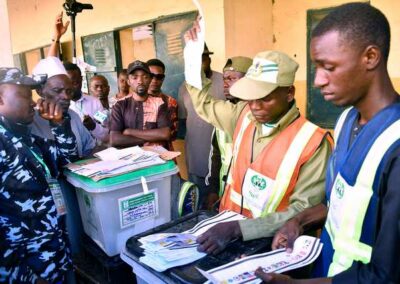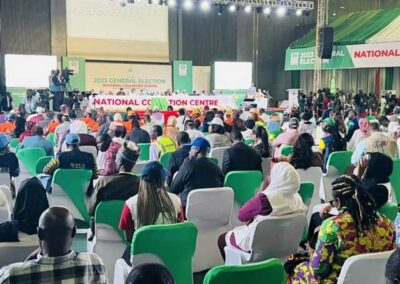In the coming hours, Nigeria’s next president will be announced by the country’s electoral body, INEC. Although the final result is still being collated, the ruling All Progressive Congress (APC) presidential candidate, Bola Ahmed Tinubu, is ahead of all other candidates according to results already announced by the commission on Monday night.
However, opposition political parties, international observers, and most Nigerians have questioned the credibility of the elections. On Monday, at the result collation centre in Abuja, agents of the two major opposition parties, the Peoples Democratic Party and the Labour Party, said they would not accept the results after the commission failed to transmit them electronically according to the electoral act. They also claimed that there was overvoting in parts of the country, especially in Ekiti State.
“Information at our disposal indicates that [INEC] deliberately refused to commence the process of announcement of results more than 48 hours after the close of the election and collation of results from the various Polling Units, which result by law was expected to be transmitted directly into INEC Server/Website as provided for under Section 68 of the Electoral Act 2022,” the PDP said in a statement.
“The integrity of this election has been compromised and vitiated by the admission of INEC officials that there was a technical glitch in the midst of the election which affected the effective functioning of the BVAS machines,” it added.
The Labour Party, Nigeria’s fastest-growing political party, also rejected the collation of the presidential election results over the commission’s inability to upload the results on its server using the BVAS machine.
What is the BVAS machine?
BVAS is the accronym for Bimodal Voters Accreditation System. Nigeria’s manual accreditation, voting, and collation system has been manipulated over the years, especially by politicians. Often, results announced were different from what transpired at the voting centres. At other times, there are results for areas where elections were not conducted as figures are manufactured from nowhere and added to the results.
Hence, before the 2023 general elections, the Independent National Electoral Commission, INEC, said it would use an electronic verification system for all voters before they could cast their ballot. This would prevent voting by proxy, identity theft, and overvoting because the number of votes cast cannot be more than the number of accredited voters. Any overvoting would lead to the nullification of the result from the voting centre.
More interestingly, to ensure the transparency of the process, the polling unit official must capture the official result and upload it to INEC Result viewing portal after voting and sorting are completed at the polling unit.
The commission, severally, had assured Nigerians that the commission would ensure that results are transmitted in real-time so that all parties could judge the process as transparent.
“We wish to reassure Nigerians that the electronic transmission of results has come to stay,” Festus Okoye, the commission’s spokesperson, said last year. “It adds to the credibility and transparency of the process when citizens follow polling unit-level results on the INEC Result Viewing (IReV) portal in real time on Election Day. There will be no change or deviation in subsequent elections.”
Unfortunately, the INEC deviated from its initial promise, hence the doubts about whether the elections were truly free, fair, credible and transparent.
No BVAS, no election
There is always a low turnout of voters in Nigeria’s elections because many citizens think their votes would be manipulated and would not count. However, to convince voters that their votes would be counted, INEC said with the use of the BVAS machine, every vote would be counted. They also assured political parties that there was no need to be afraid that the so-called big politicians would not be able to manipulate the election as no one could tamper with the machine. Hence, there was a large turnout of voters, but a very small percentage of them were allowed to vote due to voter suppression and violence.
Millions of Nigerians only trusted the system because of the introduction of the BVAS, which accredits voters and uploads the results to the result viewing portal in real time. During Saturday’s election, the BVAS was used in all polling units, and when there was no BVAS, the results were cancelled in those areas. Hence, it would not be wrong to say the machine prevented overvoting in the election.
When it was time to upload the results on the INEC result viewing portal, most officials refused to do so and even the ones that tried to could not. The results were transferred to the Local government collation centres, contrary to the assurance that they would be uploaded at the voting centres.
In several parts of the country, many believe the results were manipulated at several collation centres, which is a possibility because of Nigeria’s political structure. Pictures of final polling unit results shared online by agents of political party agents are often contrary to what is being announced by the electoral body. Hence it is difficult to trust the process, and political parties are distancing themselves from what is being announced as the final result. While some are calling for the cancellation of the entire process, others have called for the upload of the polling units results before they would accept the final collation results. For them, the BVAS is the soul of the election’s credibility.
The calls for the cancellation of the election
At the moment, no International observer has adjudged the election as transparent. Local politicians, electorates, and former leaders are calling for the immediate annulment of the process in full or in part.
“Contrary to the publicly advertised guidelines for the conduct of the elections, we are convinced that the processes leading to the results have been severely compromised,” Akin Ositokun, the director general of the Labour party’s presidential election campaign said in a statement on Monday. “Consequently, we state that we have lost confidence in the results being collated and announced.”
“We, hereby, call on INEC to suspend the further announcement of the results, and follow its own guidelines or completely cancel the entire election and make plans for another election with strict compliance with the stipulated laws and guidelines,” Ositokun added.
On a similar note, the country’s former president Olusegun Obasanjo called on the electoral body to immediately halt the collation and announcement of results until the questions raised by Nigerians are satisfactorily answered. He alleged that officials of INEC have been paid heavily to manipulate the election results.
“At this stage, we do not need wittingly or unwittingly to set this country on fire with the greed, irresponsibility and unpatriotic act of those who allegedly gave money to INEC officials for perversion and those who collected the blood money,” Obasanjo wrote in his open letter to the country’s president, Muhammadu Buhari.
He called on the INEC’s chairman to postpone the elections for four days if possible to avert the “looming danger and disaster which is just waiting to happen.
“No Bimodal Voter Accreditation System (BVAS), no result to be acceptable; and no upload through server, no result to be acceptable,” Obasanjo added in his letter. “Where BVAS and servers have been manipulated or rendered inactive, such results must be declared void and inadmissible for election declaration.”
Most Nigerians have vowed never to accept the election result, especially the youths in Southern Nigeria that feel the process was extremely flawed. Social media is already flooded with original copies of the results captured from the polling units, which are different from the announcement in Abuja. Even international observers have questioned the process.
The EU questions the credibility of Nigeria’s election
The European Union, ECOWAS, the UN, and the African Union are adequately represented in Nigeria to observe the transparency of the process. However, none of these representatives has confirmed the credibility of the poll. Instead, they have questioned the process.
“However, INEC’s lack of efficient planning in critical stages and effective public communication reduced trust in the process, including on election day,” the EU said in a statement released on Monday.
“The introduction of the Bimodal Voter Accreditation System (BVAS) and the INEC Results Viewing Portal (IReV) were perceived as an important step to ensure the integrity and credibility of the elections. However, uploading of the results using the BVAS did not work as expected and presidential election result forms started to appear on the portal very late on election day, raising concerns,” the statement added.
ECOWAS, the UN and the African Union have all called for calm and recommended a peaceful resolution of any dispute through legal means.
“The looming danger and disaster”
Many Nigerians, who feel their votes are being manipulated are already calling for a revolution and protests against the government and the government and the political class. The recent currency redesign has further increased the country’s economic woes with most citizens frustrated. There seems to be no solution to the rising cost of living and unprecedented debt by the country. Many felt the only way out was to change the ruling party, and the perception that it was manipulating the result to retain power has not gone well with many citizens.
It is unlikely that the majority of Nigerians would accept the election’s result if it ends the way it is going.
How election issues are resolved in Nigeria
Under the Nigerian constitution, election tribunals are set up immediately after the results are announced. In the Presidential election, the Court of appeal sets up a tribunal to decide if the results announced are the actual ones and if the candidate that scored the highest number of lawful votes was declared the winner. However, the ultimate decider is the Supreme Court because all previous decisions of the tribunal have been taken to the apex court. Hence, the final decider of this election could be the Supreme Court. Until then, Nigerians are still waiting for the announcement of who its next president will be.








0 Comments